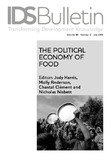Transforming Food Systems: The Potential of Engaged Political Economy
| dc.contributor.author | Anderson, Molly | |
| dc.contributor.author | Leach, Melissa | |
| dc.date.accessioned | 2019-07-30T08:32:55Z | |
| dc.date.available | 2019-07-30T08:32:55Z | |
| dc.date.issued | 2019-07-30 | |
| dc.identifier.citation | Anderson, M. and Leach, M. (2019) 'Transforming Food Systems: The Potential of Engaged Political Economy' in Harris, J., Anderson, M., Clément, C. and Nisbett, N. (Eds) The Political Economy of Food, IDS Bulletin 50.2, Brighton: IDS | en |
| dc.identifier.uri | https://opendocs.ids.ac.uk/opendocs/handle/20.500.12413/14603 | |
| dc.description.abstract | A food systems approach is critical to understanding and facilitating food system transformation, yet gaps in analysis are impeding changes towards greater equity, sustainability, and emancipation. Gaps include analyses of interdependencies among food system activities, of narrative politics, and of the behaviour of food system components using dynamic methodologies. Other problems include inappropriate boundaries to the system, insufficient learning across scales, lack of integration of social and ecological drivers and trends, and inadequate attention to the intersectional impacts of marginalisation. Both interdisciplinary and transdisciplinary work is necessary to overcome these problems, and, fundamentally, to understand power in food systems. Transdisciplinarity allows an engaged political economy in which social actors, including those who have not benefited from adequate food, livelihoods, and other services that food systems provide, are involved along with academics in co-creating the knowledge necessary for transformation. This engagement requires humility and respect, especially by academics, and explicit power-sharing. | en |
| dc.description.sponsorship | International Panel of Experts on Sustainable Food Systems (iPES Food) | en |
| dc.language.iso | en | en |
| dc.publisher | Institute of Development Studies | en |
| dc.relation.ispartofseries | IDS Bulletin;50.2 | |
| dc.rights | This is an Open Access article distributed under the terms of the Creative Commons Attribution Non Commercial 4.0 International licence (CC BY-NC), which permits use, distribution and reproduction in any medium, provided the original authors and source are credited, any modifications or adaptations are indicated, and the work is not used for commercial purposes. http://creativecommons.org/licenses/by-nc/4.0/legalcode | en |
| dc.rights.uri | http://creativecommons.org/licenses/by-nc/4.0/ | en |
| dc.subject | Nutrition | en |
| dc.title | Transforming Food Systems: The Potential of Engaged Political Economy | en |
| dc.type | Article | en |
| dc.rights.holder | Institute of Development Studies | en |
| dc.identifier.team | Health and Nutrition | en |
| dc.identifier.doi | 10.19088/1968-2019.123 | |
| dcterms.dateAccepted | 2019-07-30 | |
| rioxxterms.funder | Default funder | en |
| rioxxterms.identifier.project | Default project | en |
| rioxxterms.version | VoR | en |
| rioxxterms.funder.project | 9ce4e4dc-26e9-4d78-96e9-15e4dcac0642 | en |
Files in this item
This item appears in the following Collection(s)
Except where otherwise noted, this item's license is described as This is an Open Access article distributed under the terms of the Creative Commons Attribution Non Commercial 4.0 International licence (CC BY-NC), which permits use, distribution and reproduction in any medium, provided the original authors and source are credited, any modifications or adaptations are indicated, and the work is not used for commercial purposes. http://creativecommons.org/licenses/by-nc/4.0/legalcode


